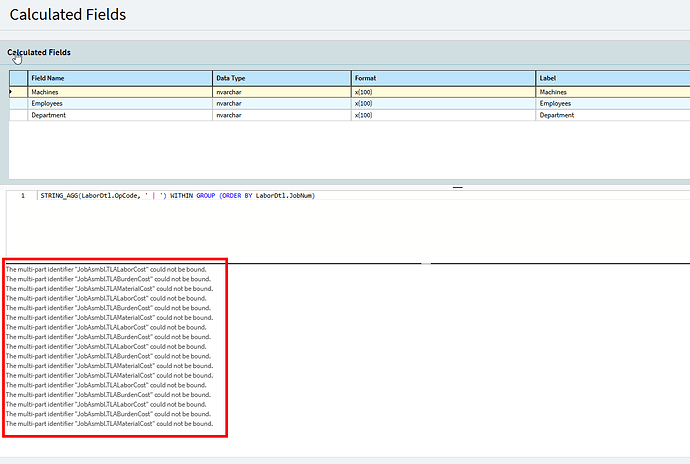Running into this error when I add a subquery. I don’t know if it has something to do with my formulas or the joins with the subquery. With the formulas, I’m trying to avoid having multiple lines for the same jobs show up on the BAQ… Full disclosure – I’m a BAQ novice!
select
[OrderHed].[OrderNum] as [OrderHed_OrderNum],
[OrderHed].[SalesRepList] as [OrderHed_SalesRepList],
((case when OrderDtl.RMANum = 0 then 'Case Only'
when OrderDtl.RMANum > 0 and ReWork.OrderHedReWork_OrderNum is null then 'Credit only'
when OrderDtl.RMANum > 0 and ReWork.OrderHedReWork_OrderNum <> '' then 'Has RMA'
else 'Oops' end)) as [Calculated_HASRMA],
[HDCase].[HDCaseNum] as [HDCase_HDCaseNum],
[OrderDtl].[RMANum] as [OrderDtl_RMANum],
[OrderDtl].[RMALine] as [OrderDtl_RMALine],
[JobHead].[JobNum] as [JobHead_JobNum],
[OrderDtl].[OrderQty] as [OrderDtl_OrderQty],
[OrderDtl].[DocExtPriceDtl] as [OrderDtl_DocExtPriceDtl],
((case when CreditMemo.Calculated_ExtCredit is null then '0' else CreditMemo.Calculated_ExtCredit end)) as [Calculated_CreditBack],
((case when OrderDtl.DocExtPriceDtl + CreditBack = 0 then .001 else OrderDtl.DocExtPriceDtl + CreditBack end)) as [Calculated_NetExtendPrice],
((JobAsmbl.TLALaborCost + JobAsmbl.TLABurdenCost)) as [Calculated_TotalLabor],
(OrderDtl.DocExtPriceDtl - (JobAsmbl.TLAMaterialCost + TotalLabor) + CreditBack) as [Calculated_Margin],
((case when OrderDtl.DocExtPriceDtl = 0 then -100 else ((Margin / OrderDtl.DocExtPriceDtl) * 100) END)) as [Calculated_MarginPCT2],
[ReWork].[OrderHedReWork_OrderNum] as [OrderHedReWork_OrderNum],
[ReWork].[OrderDtlRW_OrderLine] as [OrderDtlRW_OrderLine],
[ReWork].[OrderDtlRW_OrderQty] as [OrderDtlRW_OrderQty],
[ReWork].[JobHeadRW_JobNum] as [JobHeadRW_JobNum],
[ReWork].[JobHeadRW_JobComplete] as [JobHeadRW_JobComplete],
[ReWork].[OrderDtlRW_DocExtPriceDtl] as [OrderDtlRW_DocExtPriceDtl],
[ReWork].[Calculated_TotalLaborRW] as [Calculated_TotalLaborRW],
[ReWork].[JobAsmblRW_TLAMaterialCost] as [JobAsmblRW_TLAMaterialCost],
[ReWork].[Calculated_MarginRW] as [Calculated_MarginRW],
[ReWork].[Calculated_MarginRWPct] as [Calculated_MarginRWPct],
((OrderDtl.DocExtPriceDtl + ReWork.OrderDtlRW_DocExtPriceDtl) + CreditBack) as [Calculated_TTExtPrice],
(TotalLabor + ReWork.Calculated_TotalLaborRW + ReWork.JobAsmblRW_TLAMaterialCost + JobAsmbl.TLAMaterialCost) as [Calculated_TTCOST],
(Margin + ReWork.Calculated_MarginRW) as [Calculated_TTMargin],
(((TTExtPrice - TTCOST ) / TTExtPrice )*100) as [Calculated_TTMarginPct],
(OrderDtl.OrderQty + ReWork.OrderDtlRW_OrderQty) as [Calculated_TTQty],
((case when CreditBack < 0 then 'Yes' else 'No' end)) as [Calculated_CreditMemo],
[HDCase].[Description] as [HDCase_Description],
[HDCase].[ResolutionText] as [HDCase_ResolutionText]
from Erp.OrderHed as [OrderHed]
inner join Erp.OrderDtl as [OrderDtl] on
OrderHed.Company = OrderDtl.Company
and OrderHed.OrderNum = OrderDtl.OrderNum
and ( OrderDtl.OrderQty >= 1 )
inner join Erp.QuoteDtl as [QuoteDtl] on
QuoteDtl.QuoteNum = OrderDtl.QuoteNum
and QuoteDtl.QuoteLine = OrderDtl.QuoteLine
inner join Erp.JobHead as [JobHead] on
QuoteDtl.Company = JobHead.Company
and QuoteDtl.QuoteNum = JobHead.QuoteNum
and QuoteDtl.QuoteLine = JobHead.QuoteLine
left outer join (select
[JobAsmbl].[TLAMaterialCost] as [JobAsmbl_TLAMaterialCost],
[JobAsmbl].[JobNum] as [JobAsmbl_JobNum],
[LaborDtlSub].[Calculated_Machines] as [Calculated_Machines],
[LaborDtlSub].[Calculated_Employees] as [Calculated_Employees],
[LaborDtlSub].[Calculated_Department] as [Calculated_Department]
from Erp.JobAsmbl as [JobAsmbl]
left outer join (select
[LaborDtl].[JobNum] as [LaborDtl_JobNum],
( STRING_AGG(LaborDtl.OpCode, ' | ') WITHIN GROUP (ORDER BY LaborDtl.JobNum)) as [Calculated_Machines],
(STRING_AGG(LaborDtl.EmployeeNum, ' | ') WITHIN GROUP (ORDER BY LaborDtl.JobNum)) as [Calculated_Employees],
( STRING_AGG(LaborDtl.JCDept, ' | ') WITHIN GROUP (ORDER BY LaborDtl.JobNum)) as [Calculated_Department]
from Erp.LaborDtl as [LaborDtl]
group by
[LaborDtl].[JobNum]) as [LaborDtlSub] on
JobAsmbl.JobNum = LaborDtlSub.LaborDtl_JobNum
where (JobAsmbl.AssemblySeq = 0)
group by
[JobAsmbl].[TLAMaterialCost],
[JobAsmbl].[JobNum],
[LaborDtlSub].[Calculated_Machines],
[LaborDtlSub].[Calculated_Employees],
[LaborDtlSub].[Calculated_Department]) as [JobAsmblSub] on
JobHead.Company = JobAsmblSub.JobAsmbl_JobNum
and JobHead.JobNum = JobAsmblSub.JobAsmbl_JobNum
left outer join (select
[QuoteDtlRW].[QuoteNum] as [QuoteDtlRW_QuoteNum],
[QuoteDtlRW].[REWORKRMA_c] as [QuoteDtlRW_REWORKRMA_c],
[QuoteDtlRW].[REWORKRMALINE_c] as [QuoteDtlRW_REWORKRMALINE_c],
[OrderHedReWork].[OrderNum] as [OrderHedReWork_OrderNum],
[OrderDtlRW].[OrderLine] as [OrderDtlRW_OrderLine],
[JobHeadRW].[JobComplete] as [JobHeadRW_JobComplete],
[JobHeadRW].[JobNum] as [JobHeadRW_JobNum],
((JobAsmblRW.TLALaborCost + JobAsmblRW.TLABurdenCost)) as [Calculated_TotalLaborRW],
[JobAsmblRW].[TLAMaterialCost] as [JobAsmblRW_TLAMaterialCost],
[OrderDtlRW].[OrderQty] as [OrderDtlRW_OrderQty],
[OrderDtlRW].[DocExtPriceDtl] as [OrderDtlRW_DocExtPriceDtl],
(OrderDtlRW.DocExtPriceDtl - (JobAsmblRW.TLAMaterialCost + TotalLaborRW)) as [Calculated_MarginRW],
(((MarginRW / OrderDtlRW.DocExtPriceDtl)*100)) as [Calculated_MarginRWPct]
from Erp.OrderHed as [OrderHedReWork]
right outer join Erp.OrderDtl as [OrderDtlRW] on
OrderHedReWork.Company = OrderDtlRW.Company
and OrderHedReWork.OrderNum = OrderDtlRW.OrderNum
right outer join Erp.QuoteDtl as [QuoteDtlRW] on
QuoteDtlRW.QuoteNum = OrderDtlRW.QuoteNum
and QuoteDtlRW.QuoteLine = OrderDtlRW.QuoteLine
inner join Erp.JobHead as [JobHeadRW] on
QuoteDtlRW.Company = JobHeadRW.Company
and QuoteDtlRW.QuoteNum = JobHeadRW.QuoteNum
and QuoteDtlRW.QuoteLine = JobHeadRW.QuoteLine
inner join Erp.JobAsmbl as [JobAsmblRW] on
JobHeadRW.Company = JobAsmblRW.Company
and JobHeadRW.JobNum = JobAsmblRW.JobNum
and ( JobAsmblRW.AssemblySeq = 0 )
where (OrderHedReWork.HASREWORK_c = True)) as [ReWork] on
ReWork.QuoteDtlRW_REWORKRMA_c = OrderDtl.RMANum
and ReWork.QuoteDtlRW_REWORKRMALINE_c = OrderDtl.RMALine
left outer join (select
[InvcDtl].[OrderNum] as [InvcDtl_OrderNum],
[InvcDtl].[OrderLine] as [InvcDtl_OrderLine],
[InvcDtl].[DocExtPrice] as [InvcDtl_DocExtPrice],
(SUM(InvcDtl.DocExtPrice)) as [Calculated_ExtCredit]
from Erp.InvcHead as [InvcHead]
left outer join Erp.InvcDtl as [InvcDtl] on
InvcHead.Company = InvcDtl.Company
and InvcHead.InvoiceNum = InvcDtl.InvoiceNum
where (InvcHead.CreditMemo = True
and not InvcHead.InvoiceNum IN (187953)
and InvcHead.RMANum > 0
and not InvcHead.InvoiceAmt = 0)
group by
[InvcDtl].[OrderNum],
[InvcDtl].[OrderLine],
[InvcDtl].[DocExtPrice]) as [CreditMemo] on
CreditMemo.InvcDtl_OrderNum = OrderDtl.OrderNum
and CreditMemo.InvcDtl_OrderLine = OrderDtl.OrderLine
inner join Erp.HDCase as [HDCase] on
OrderDtl.OrderNum = HDCase.OrderNum
and OrderDtl.OrderLine = HDCase.OrderLine
where (OrderHed.VoidOrder = False)
order by OrderDtl.OrderNum, OrderDtl.OrderLine


